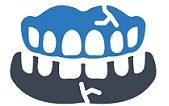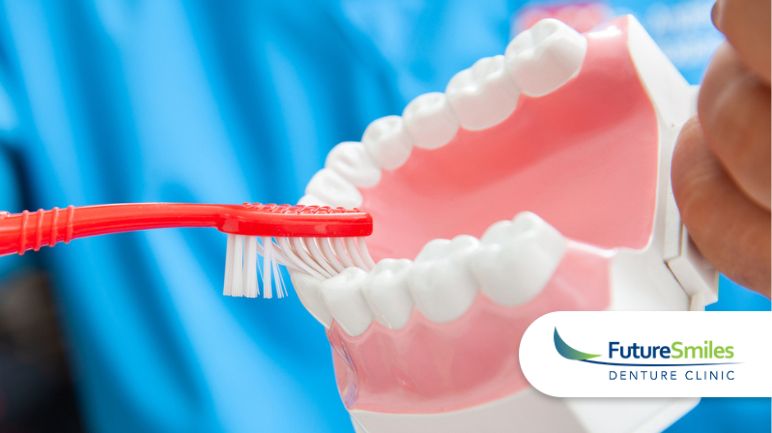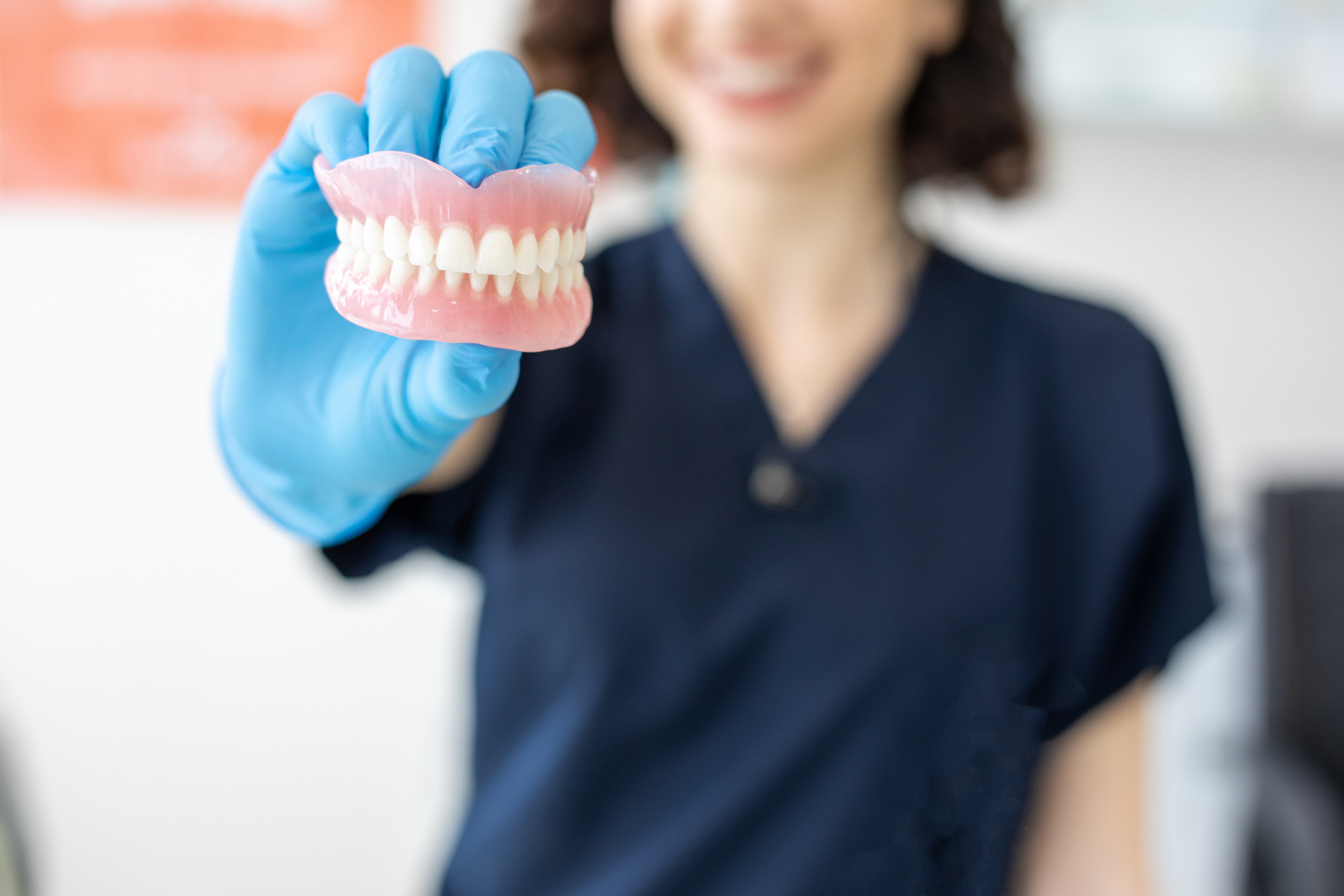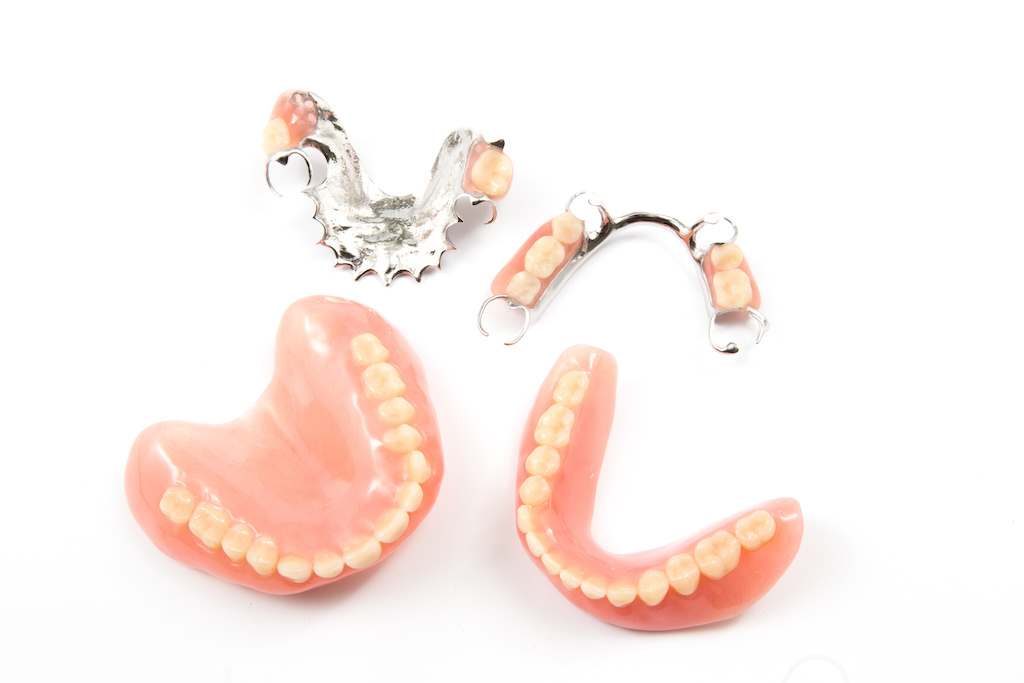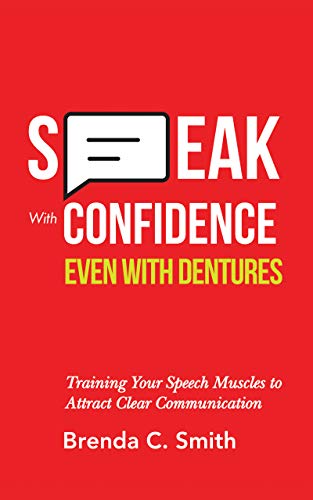Maintaining Oral Hygiene With Dentures: Do’s and Don’ts
Do you wear dentures and want to ensure a dazzling smile? Discover the do’s and don’ts of maintaining oral hygiene with dentures!
Keeping your dentures clean and in good condition is essential for optimal oral health. In this guide, we will provide you with simple tips and tricks to follow.
From establishing a daily cleaning routine to properly storing your dentures, we’ve got you covered. Avoid harmful habits that can damage your dentures and learn the importance of regular dental check-ups.
Managing denture adhesive and handling repairs are also crucial aspects to consider. So, let’s dive in and delve into the world of denture care to keep your pearly whites shining bright!
Key Takeaways
– Properly clean and store dentures daily to maintain oral hygiene and prevent bacterial growth.
– Avoid harmful habits such as using sharp objects or harsh chemicals on dentures, and refrain from biting or chewing on hard objects.
– Schedule regular dental check-ups to assess the condition of dentures, check for oral infections, and receive professional cleaning and advice on denture care.
– Seek professional assistance for denture repairs and avoid attempting DIY fixes to prevent further damage and ensure optimal results.
Daily Cleaning Routine
To maintain proper oral hygiene with dentures, it’s important that you establish a daily cleaning routine. This routine will help ensure that your dentures stay clean, fresh, and free from bacteria.
Start by removing your dentures from your mouth and rinsing them under running water. Be careful not to drop them, as they can easily break.
Next, use a denture brush or a soft-bristled toothbrush to gently clean your dentures. Avoid using regular toothpaste, as it can be too abrasive and damage the dentures. Instead, use a mild denture cleaner or a non-abrasive soap to clean them thoroughly. Make sure to clean all surfaces of the dentures, including the gums and the clasps.
Once you have finished cleaning, rinse the dentures thoroughly with water to remove any residue from the cleaner.
It’s also important to clean your mouth after removing your dentures. Use a soft toothbrush to brush your gums, tongue, and the roof of your mouth. This will help remove any bacteria and keep your mouth healthy.
Remember to clean your dentures every day to maintain good oral hygiene.
Proper Denture Storage
To properly maintain your dentures and ensure their longevity, it’s crucial that you store them in the correct manner. Proper denture storage is essential to prevent damage and keep them clean and hygienic. Here are some do’s and don’ts for storing your dentures.
Firstly, when not wearing your dentures, make sure to keep them moist. Dryness can cause them to warp or become brittle. Soaking them in a denture cleaning solution or plain water overnight is recommended. Avoid using hot water, as it can deform the shape of the dentures.
Additionally, it’s important to store your dentures in a safe and clean place. Use a denture case or container that’s specifically designed for this purpose. Avoid leaving them exposed on a countertop or in a tissue, as they can easily be damaged or lost. Keep them away from children and pets to avoid accidents.
Furthermore, remember to clean your denture case regularly. Bacteria and fungi can accumulate, leading to oral infections or bad odors. Use a denture brush or toothbrush to clean the case with soap and water, and rinse it thoroughly before storing your dentures.
Avoiding Harmful Habits
To avoid damaging your dentures and maintaining optimal oral hygiene, it’s important to be mindful of certain harmful habits.
First and foremost, avoid using toothpicks or any sharp objects to clean your dentures. While it may seem like a convenient way to remove food particles, these objects can scratch or even break your dentures. Instead, use a soft-bristled toothbrush or a denture brush specifically designed for cleaning dentures.
Another harmful habit to avoid is using harsh chemicals or abrasive toothpaste on your dentures. These substances can cause discoloration, scratches, and damage to the denture material. Stick to mild, non-abrasive cleaners or denture cleansers recommended by your dentist.
Furthermore, resist the temptation to bite or chew on hard objects, such as ice, pens, or bottle caps. Doing so can put excessive pressure on your dentures and lead to cracks or fractures.
Lastly, avoid sleeping with your dentures in your mouth. Removing your dentures at night allows your gums and oral tissues to rest and recover from the pressure of wearing dentures all day. It also gives you the opportunity to clean your dentures thoroughly before wearing them again.
Regular Dental Check-ups
Now let’s talk about the importance of regular dental check-ups when it comes to maintaining oral hygiene with dentures.
These check-ups are crucial for preventing any potential oral health issues that may arise and ensuring the long-term maintenance of your dentures.
Importance of Check-Ups
Make sure to schedule regular dental check-ups to prioritize the importance of maintaining oral hygiene with dentures.
Regular dental check-ups are essential for several reasons. Firstly, they allow your dentist to assess the condition of your dentures and identify any issues or damage that may need to be addressed. This ensures that your dentures fit properly and function effectively.
Additionally, check-ups enable your dentist to examine your mouth for any signs of gum disease or oral infections, which can be common among denture wearers. Early detection of these issues is crucial for effective treatment and prevention of further complications.
Moreover, regular check-ups provide an opportunity for your dentist to professionally clean your dentures, removing any accumulated plaque or stains.
Preventing Oral Health Issues
Schedule regular dental check-ups to prevent oral health issues and maintain optimal oral hygiene with dentures.
Regular check-ups are essential for preventing oral health problems and ensuring that your dentures fit properly.
During these appointments, your dentist will examine your mouth and dentures to identify any potential issues early on. They’ll also clean your dentures thoroughly, removing any plaque or tartar buildup that can lead to gum disease or bad breath.
Additionally, your dentist will provide valuable advice on how to properly care for your dentures and maintain good oral hygiene.
Long-Term Denture Maintenance
To maintain optimal oral hygiene with dentures, it’s important to regularly visit your dentist for check-ups. Regular dental check-ups are crucial for ensuring the longevity and effectiveness of your dentures. Here are four reasons why you should prioritize these appointments:
1. Professional cleaning: Your dentist has the expertise and tools to clean your dentures thoroughly, removing any plaque or tartar buildup that may have accumulated.
2. Detection of oral health issues: Regular check-ups allow your dentist to identify any potential oral health issues early on. This includes monitoring the condition of your gums, checking for signs of infection or irritation, and examining the fit and functionality of your dentures.
3. Adjustments and repairs: Over time, dentures may require adjustments or repairs due to wear and tear. Regular dental check-ups allow your dentist to make the necessary adjustments to ensure your dentures fit properly and comfortably.
4. Oral cancer screenings: During your check-up, your dentist will also perform an oral cancer screening to detect any abnormalities or signs of oral cancer.
Managing Denture Adhesive
You should regularly apply denture adhesive to ensure a secure fit and comfortable wear throughout the day. Denture adhesive is a product that helps hold your dentures in place, preventing them from slipping or moving while you eat, speak, or laugh. It forms a thin, sticky layer between your dentures and gums, creating a stronger bond and reducing the risk of irritation or soreness.
When applying denture adhesive, it’s important to follow the instructions provided by the manufacturer. Start by cleaning your dentures thoroughly and making sure they’re dry. Then, apply a small amount of adhesive in short strips or dots along the ridge of your denture. Avoid applying too much adhesive, as it can lead to excess oozing or discomfort.
It’s also essential to clean your dentures and gums regularly to maintain oral hygiene. Remove your dentures every night and clean them with a denture brush and mild denture cleanser. Rinse your mouth with water or mouthwash, and gently brush your gums, tongue, and palate to remove any adhesive residue.
Handling Denture Repairs
When it comes to handling denture repairs, there are a few key points to keep in mind.
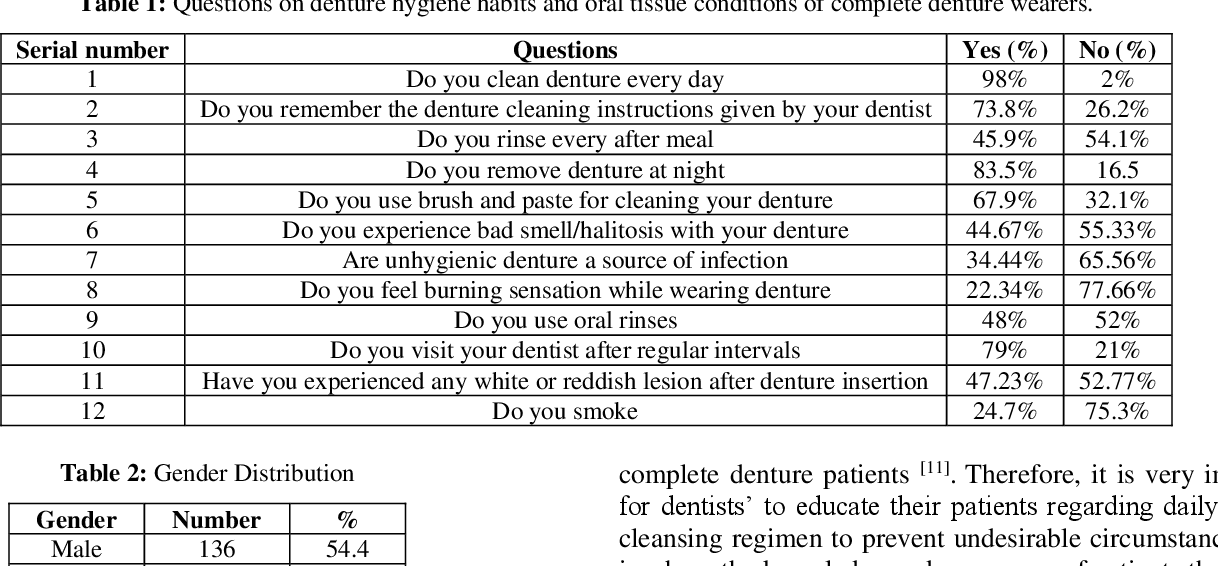
First, it’s important to know that attempting DIY repairs can often lead to more damage and costly fixes down the line.
Instead, it’s best to seek professional assistance from a dentist or denturist who’s the expertise and tools to properly repair dentures.
DIY Denture Repairs
Ensure the proper handling of denture repairs by following the manufacturer’s instructions and using appropriate tools and materials. When it comes to DIY denture repairs, there are a few important things to keep in mind:
1. Avoid using household adhesives: While it may be tempting to use regular glue or superglue to fix your dentures, these substances can contain harmful chemicals that may damage your dentures or even harm your health.
2. Use denture repair kits: Instead of resorting to makeshift solutions, invest in a denture repair kit. These kits usually come with all the necessary materials and instructions to fix minor issues, such as broken or cracked dentures.
3. Handle with care: When repairing your dentures, make sure to handle them gently. Dentures are delicate and can easily break or crack if mishandled.
4. Know your limits: While minor repairs can be done at home, it’s important to know when to seek professional help. If your dentures have major damage or require complex repairs, it’s best to consult your dentist or a denture specialist.
Seeking Professional Assistance
For optimal results, it’s recommended to consult a dentist or denture specialist for professional assistance with handling denture repairs.
While some people may be tempted to attempt DIY denture repairs, it’s important to understand that dentures are delicate and require professional expertise to ensure proper maintenance and longevity.
Denture repairs shouldn’t be taken lightly, as improper handling can lead to further damage or discomfort. By seeking professional assistance, you can ensure that your dentures are repaired correctly and efficiently.
Dentists and denture specialists have the necessary knowledge, skills, and tools to assess the extent of the damage and provide appropriate solutions. They can also offer valuable advice on preventive measures to minimize the risk of future repairs.
Preventing Further Damage
To prevent further damage when handling denture repairs, it’s important to carefully and gently manipulate your dentures. Here are four important tips to keep in mind:
1. Avoid using excessive force: When handling your dentures, be gentle and avoid applying too much pressure. Excessive force can cause cracks or fractures, leading to costly repairs.
2. Use both hands: Always hold your dentures securely with both hands to prevent them from slipping or dropping. This will minimize the risk of accidental damage.
3. Handle over a soft surface: When removing or inserting your dentures, do it over a soft surface, such as a towel or basin filled with water. In case they slip from your hands, the soft surface will cushion the fall and reduce the chances of breakage.
4. Avoid DIY repairs: While it may be tempting to fix minor issues yourself, it’s best to leave denture repairs to professionals. Attempting DIY repairs can result in further damage and compromise the fit and function of your dentures.
Frequently Asked Questions
Can I Use Regular Toothpaste to Clean My Dentures?
Yes, you can use regular toothpaste to clean your dentures, but it’s important to choose a non-abrasive one. Regular toothpaste can help remove stains and bacteria from your dentures, keeping them clean and fresh.
However, avoid using toothpaste with harsh ingredients, as they can damage the denture material.
It’s also recommended to brush your dentures at least twice a day, just like you’d with natural teeth. Regular cleaning will help maintain good oral hygiene and extend the lifespan of your dentures.
How Often Should I Soak My Dentures in a Denture Cleaner?
How often should you soak your dentures in a denture cleaner?
It’s recommended that you soak your dentures in a denture cleaner at least once a day. This helps to remove any stains, bacteria, and odors that may have accumulated throughout the day.
Soaking your dentures overnight can be particularly beneficial, as it allows the cleaner to thoroughly penetrate and clean the dentures.
Be sure to follow the instructions provided with your denture cleaner for the best results.
Can I Sleep With My Dentures On?
You shouldn’t sleep with your dentures on. It’s important to remove them at night to give your gums and mouth a chance to rest and recover. Sleeping with dentures can lead to irritation, sores, and infections.
It’s recommended to remove your dentures before going to bed and store them in a clean container with water or a denture cleaner. This will help maintain good oral hygiene and keep your dentures in good condition.
What Should I Do if My Dentures Become Loose or Uncomfortable?
If your dentures become loose or uncomfortable, there are a few things you can do.
First, try gently biting down and swallowing to see if that helps them fit better.
If that doesn’t work, you may need to visit your dentist to have them adjusted. Remember to never try to adjust them yourself, as this can cause damage.
Your dentist will be able to make the necessary adjustments to ensure your dentures fit comfortably and securely.
Are There Any Foods That I Should Avoid While Wearing Dentures?
You should avoid certain foods while wearing dentures to maintain their stability and prevent damage. Sticky and chewy foods like caramel and chewing gum can cause your dentures to become loose or dislodged.
Hard and crunchy foods like nuts and chips can also pose a risk of denture breakage.
It’s best to opt for softer foods and cut them into smaller pieces to make chewing easier and safer.
Remember to maintain good oral hygiene by cleaning your dentures regularly.
Conclusion
In conclusion, by following these simple do’s and don’ts, you can maintain good oral hygiene with dentures.
Taking care of your dentures through daily cleaning, proper storage, and avoiding harmful habits is crucial.
Regular dental check-ups and managing denture adhesive will also ensure their longevity.
Lastly, promptly handling any denture repairs will p his comment is here revent further damage.
With these practices in place, you can confidently maintain a healthy smile and enjoy the benefits of your dentures.
